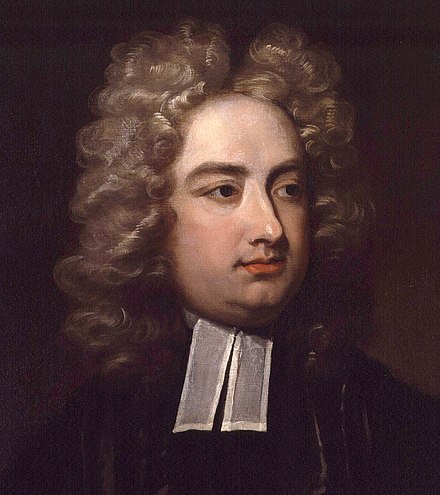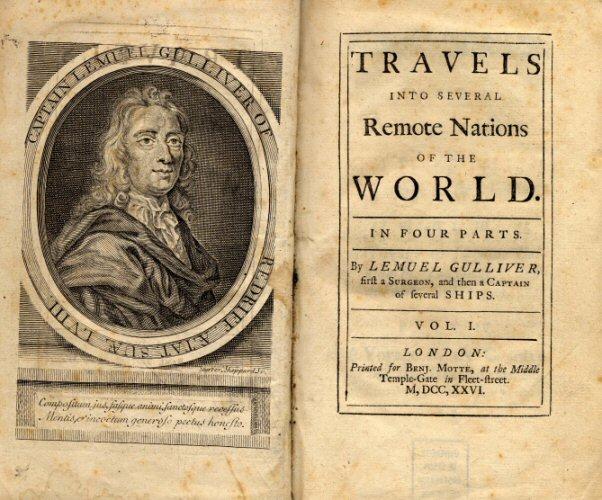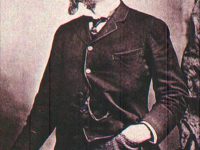
Jonathan Swift (1667-1745)
On November 30, 1667, Anglo-Irish satirist, essayist, political pamphleteer, poet and cleric Jonathan Swift was born. He is probably best remembered for his satire “Gulliver’s Travels” and is regarded as the foremost prose satirist in the English language, who originally published all of his works under pseudonyms.
“Satire is a sort of glass, wherein beholders do generally discover everybody’s face but their own.”
— Jonathan Swift, The Battle of the Books, preface (1704)
Early Life
Jonathan Swift was born in Hoey’s Court, Dublin, seven months after the death of his father of the same name. He spent the first five years of his life with a nanny in England, while his mother stayed in Ireland, but then moved to Leicester (England). Jonathan was raised by relatives after his return to Dublin. In 1682, at the request of his uncle, he enrolled as a theology student at Dublin University, where he was said to have been noticed as rebellious; he only received his degree “by special favour“. After his training in Dublin he went to England and took up a position as secretary with Sir William Temple, a retired diplomat and distant relative of his mother. This enabled him to continue his university education as a Master of Arts, which he received at Hart Hall in Oxford. Swift returned to Ireland and was ordained priest of the Anglican Church of Ireland.
First Literary Success
During his second employment with Sir William (from 1695 on) Swift completed his first major work, A Tale of a Tub and The Battle of the Books, which were both to be published in 1704. Here he also met Esther Johnson, Sir Williams’ illegitimate daughter. The death of his patron in 1698 ended Swift’s good position; he could no longer hope for a high position in the Church in England and moved back to Ireland. There he found employment in the church again. Esther Johnson followed him and settled in the nearby Trim. His literary career began in 1701 with the anonymous publication of Dissensions in Athens and Rome. With the publication of the satires A Tale of a Tub and The Battle of the Books Swift gained a reputation as a writer.
Sharp-Tounged Political Satires
“Laws are like Cobwebs which may catch small Flies, but let Wasps and Hornets break through.”
— Jonathan Swift, A Tritical Essay upon the Faculties of the Mind (1707)
After a failed political engagement, first for the Whigs and, because of disappointment about their politics, from 1710 for the Tories, Queen Anne‘s death ended the influence of the Tories and thus also Swift’s political career. He was editor of the Tory weekly Examiner in 1710/1711. Swift, who was considered ambitious, had also been helped by his political activities with the Tories to become dean of St. Patrick’s in Dublin. His return to Ireland was followed by sharp-tongued political satires in which he attacked the exploitation of the destitute Irish by English landowners. Some satires caused such a stir that the English government offered 300 pounds for finding the anonymous author. In addition to his relationship with Esther Johnson, Swift had an eleven-year secret affair with Esther Vanhomrigh, whom he called Vanessa, who knew nothing about Stella and died in 1723 shortly after Swift confessed to her. Stella died in 1728. In 1729 Swift was appointed honorary citizen of Dublin.
Gulliver’s Travels
“He is taller by almost the breadth of my nail, than any of his court, which alone is enough to strike an awe into the beholders.”
— Jonathan Swift in Gulliver’s Travels, On the Emperor of Lilliput, in Voyage to Lilliput, Ch. 2
Little of Swift’s early attempts at writing have survived. Only after his return to Ireland are there writings that identify him as the satirist known to this day. His novel The travels into several remote nations of the world by Lemuel Gulliver was published in 1726. For a long time mainly regarded as a children’s book, and robbed of its satire in abridged editions, it is often undervalued. In a kind of robinsonade,[1] Swift describes Gulliver’s travels to various countries, whose ridiculed peculiarities the Enlightenment uses as sharp points against the English ruling class, the Royal Academy and human nature in general. Another interesting detail of the story is the description of two Martian moons; in fact, 150 years later, two Martian moons were discovered. In honor of Swift, the largest crater on the moon Deimos was named after him. He then wrote several times against the conditions in English ruled Ireland. His best-known satire is A Modest Proposal for Preventing the Children of Poor People in Ireland Being a Burden on Their Parents or Country, and for Making Them Beneficial to the Publick, in which he proposes to eliminate overpopulation, poverty and crime by using Irish babies as food and making a profit by exporting it.

Title page of first edition of Gulliver’s Travels by Jonathan Swift.
Later Years and Death
For a long time Swift suffered from an inner ear disease that caused dizziness and became more and more severe in his old age. Another disease caused siliceous substances to collect in his body, which he himself called urngries. Swift was considered irritable, rude and eccentric. In 1733 a grotesque treatise on faeces was published: “Human bowel movement from a botanical point of view“, according to the cover by Dr. S—–t. There are controversial assumptions that he had been in a state of mental derangement since 1740, before he became an invalid after a stroke in 1742. Jonathan Swift died in 1745. On his memorial tablet is an epitaph of his own composition, which says that he lies “where savage indignation can no longer tear his heart.”[4]
Jonathan Swift: His Life and His World – Leo Damrosch: May 14, 2014 [6]
References and Further Reading:
- [1] The Incredible Story of Robinson Crusoe, SciHi Blog
- [2] Texts from or about Jonathan Swift at Wikisource
- [3] Chisholm, Hugh, ed. (1911). “Swift, Jonathan“. Encyclopædia Britannica (11th ed.). Cambridge University Press.
- [4] Jonathan Swift at Britannica Online
- [5] Jonathan Swift at Wikidata
- [6] Leo Damrosch, Jonathan Swift: His Life and His World, May 14, 2014, The Kansas City Public Library @ youtube
- [7] Stephen, Leslie (1898). . In Lee, Sidney (ed.). Dictionary of National Biography. 55. London: Smith, Elder & Co. p. 204.
- [8] Sir Walter Scott Memoirs of Jonathan Swift, D.D., Dean of St. Patrick’s, Dublin. Paris: A. and W. Galignani, 1826.
- [9] Whibley, Charles (1917). Jonathan Swift: the Leslie Stephen lecture delivered before the University of Cambridge on 26 May 1917. Cambridge: Cambridge University Press.
- [10] Timeline for Jonathan Swift, via Wikidata





